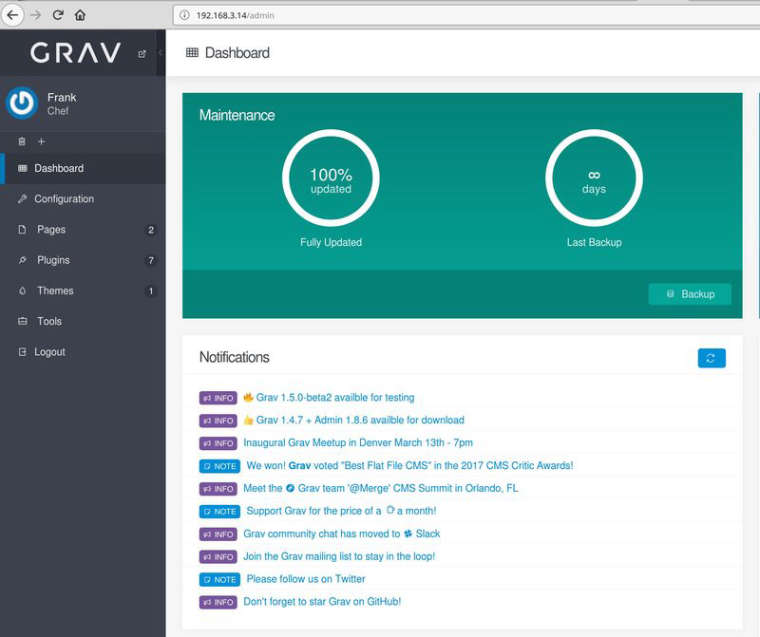Wird nochmal überarbeitet, da ich noch über einige Probleme gestolpert bin! Für Einsteiger im Moment nur bedingt zu empfehlen!
Ich hatte schon mal auf einem Debian System PHP7 installiert -> https://frank-mankel.de/kategorien/15-joomla/202-debian-joomla-mit-php7-auf-nginx
Nun habe ich das auf einem ROCKPro64 gemacht und ein wenig Kopfschmerzen bekommen  Ziel des Ganzen ist es eine Grav-Installation zum Laufen zu bekommen.
Ziel des Ganzen ist es eine Grav-Installation zum Laufen zu bekommen.
Hardware
Software
Linux
rock64@rockpro64v2_0:~$ uname -a
Linux rockpro64v2_0 4.4.132-1081-rockchip-ayufan-g50be7e64a779 #1 SMP Tue Jul 31 20:09:25 UTC 2018 aarch64 aarch64 aarch64 GNU/Linux
NGinx
rock64@rockpro64:~$ nginx -v
nginx version: nginx/1.14.0 (Ubuntu)
PHP
rock64@rockpro64:~$ php -v
PHP 7.2.7-0ubuntu0.18.04.2 (cli) (built: Jul 4 2018 16:55:24) ( NTS )
Copyright (c) 1997-2018 The PHP Group
Zend Engine v3.2.0, Copyright (c) 1998-2018 Zend Technologies
with Zend OPcache v7.2.7-0ubuntu0.18.04.2, Copyright (c) 1999-2018, by Zend Technologies
Installation
NGinx
sudo apt-get install nginx
PHP
sudo apt-get install php7.2
Benötigte Module für PHP
sudo apt-get install php7.2-mysql php7.2-opcache php7.2-readline php7.2-xml php7.2-xsl php7.2-zip
sudo apt-get install php7.2-cli php7.2-curl php7.2-gd php7.2-geoip php7.2-intl php7.2-json php7.2-mbstring
Konfiguration NGinx
/etc/nginx/nginx.conf
user www-data;
worker_processes auto;
worker_rlimit_nofile 8192; # should be bigger than worker_connections
pid /run/nginx.pid;
events {
use epoll;
worker_connections 8000;
multi_accept on;
}
http {
sendfile on;
tcp_nopush on;
tcp_nodelay on;
keepalive_timeout 30; # longer values are better for each ssl client, but take up a worker connection longer
types_hash_max_size 2048;
server_tokens off;
# maximum file upload size
# update 'upload_max_filesize' & 'post_max_size' in /etc/php5/fpm/php.ini accordingly
client_max_body_size 32m;
# client_body_timeout 60s; # increase for very long file uploads
# set default index file (can be overwritten for each site individually)
index index.html;
# load MIME types
include mime.types; # get this file from https://github.com/h5bp/server-configs-nginx
default_type application/octet-stream; # set default MIME type
# logging
access_log /var/log/nginx/access.log;
error_log /var/log/nginx/error.log;
# turn on gzip compression
gzip on;
gzip_disable "msie6";
gzip_vary on;
gzip_proxied any;
gzip_comp_level 5;
gzip_buffers 16 8k;
gzip_http_version 1.1;
gzip_min_length 256;
gzip_types
application/atom+xml
application/javascript
application/json
application/ld+json
application/manifest+json
application/rss+xml
application/vnd.geo+json
application/vnd.ms-fontobject
application/x-font-ttf
application/x-web-app-manifest+json
application/xhtml+xml
application/xml
font/opentype
image/bmp
image/svg+xml
image/x-icon
text/cache-manifest
text/css
text/plain
text/vcard
text/vnd.rim.location.xloc
text/vtt
text/x-component
text/x-cross-domain-policy;
# disable content type sniffing for more security
add_header "X-Content-Type-Options" "nosniff";
# force the latest IE version
add_header "X-UA-Compatible" "IE=Edge";
# enable anti-cross-site scripting filter built into IE 8+
add_header "X-XSS-Protection" "1; mode=block";
# include virtual host configs
include sites-enabled/*;
}
Unter /etc/nginx/sites-available die Datei default löschen. Die Datei grav-site anlegen.
/etc/nginx/sites-available/grav-site
server {
#listen 80;
index index.html index.php;
## Begin - Server Info
root /var/www/grav;
server_name localhost;
## End - Server Info
## Begin - Index
# for subfolders, simply adjust:
# `location /subfolder {`
# and the rewrite to use `/subfolder/index.php`
location / {
try_files $uri $uri/ /index.php?$query_string;
}
## End - Index
## Begin - Security
# deny all direct access for these folders
location ~* /(\.git|cache|bin|logs|backup|tests)/.*$ { return 403; }
# deny running scripts inside core system folders
location ~* /(system|vendor)/.*\.(txt|xml|md|html|yaml|yml|php|pl|py|cgi|twig|sh|bat)$ { return 403; }
# deny running scripts inside user folder
location ~* /user/.*\.(txt|md|yaml|yml|php|pl|py|cgi|twig|sh|bat)$ { return 403; }
# deny access to specific files in the root folder
location ~ /(LICENSE\.txt|composer\.lock|composer\.json|nginx\.conf|web\.config|htaccess\.txt|\.htaccess) { return 403; }
## End - Security
## Begin - PHP
location ~ \.php$ {
# Choose either a socket or TCP/IP address
#fastcgi_pass unix:/var/run/php/php7.0-fpm.sock;
fastcgi_pass 127.0.0.1:9000;
fastcgi_split_path_info ^(.+\.php)(/.+)$;
fastcgi_index index.php;
include fastcgi_params;
fastcgi_param SCRIPT_FILENAME $document_root/$fastcgi_script_name;
}
## End - PHP
}
Danach brauchen wir einen symbolischen Link in /etc/nginx/sites-enabled Nur dann funktioniert eine Seite.
sudo ln -s /etc/nginx/sites-available/grav-site /etc/nginx/sites-enabled/
Installation Grav
Core installieren
Option 3 der Anleitung https://learn.getgrav.org/basics/installation
Admin Panel installieren
https://learn.getgrav.org/admin-panel/introduction
Meine Grav-Installation liegt unter
/var/www/grav
Womit hatte ich nun Probleme? NGinx dient ja als Webserver, dieser Webserver muss jetzt die PHP-Dateien entsprechend verarbeiten können. Dazu gibt es folgenden Block in der Datei /etc/nginx/sites-available/grav-site
## Begin - PHP
location ~ \.php$ {
# Choose either a socket or TCP/IP address
#fastcgi_pass unix:/var/run/php/php7.0-fpm.sock;
fastcgi_pass 127.0.0.1:9000;
fastcgi_split_path_info ^(.+\.php)(/.+)$;
fastcgi_index index.php;
include fastcgi_params;
fastcgi_param SCRIPT_FILENAME $document_root/$fastcgi_script_name;
}
## End - PHP
Es war vorher folgendermaßen
fastcgi_pass unix:/var/run/php/php7.2-fpm.sock;
#fastcgi_pass 127.0.0.1:9000;
Das hat nicht geklappt. Was sagt die Ubuntu Seite dazu?? Man soll folgendes machen. Datei /usr/local/bin/php-fastcgi anlegen.
#!/bin/bash
php-cgi -b 127.0.0.1:9000
Ausführungsrechte
chmod a+x /usr/local/bin/php-fastcgi
Danach starten
sudo php-fastcgi
Das funktioniert aber nur, wenn folgendes eingestellt ist.
#fastcgi_pass unix:/var/run/php/php7.2-fpm.sock;
fastcgi_pass 127.0.0.1:9000;
Damit wird PHP direkt an die FastCGI-Schnittstelle gebunden.
Quelle: https://wiki.ubuntuusers.de/nginx/PHP/
Danach lief meine Grav-Installation.

So weit so gut. Ein kleiner Schönheitsfehler. Konsole zu beendet
sudo php-fastcgi
dann war es das wieder mit NGinx. Die Lösung wir brauchen eine Datei /etc/rc.local
#!/bin/bash
#
# rc.local - executed at the end of each multiuser runlevel
#
# Make sure that the script will "exit 0" on success or any other
# value on error.
php-fastcgi
exit 0
Den Dienst dann nach dieser Anleitung einrichten

If you are running a Linux distro that uses Systemd, then you may find that your command in /etc/rc.local file would not run at system boot time. This guide explains how to enable /etc/rc.local script to run on system startup. Enable /etc/rc.local on Systemd If you type the following command in terminal: sudo systemctl status…

LinuxBabe (www.linuxbabe.com)
Danach den Server neu starten und es funktioniert!
Achtung! Nicht auf einem produktiven System einsetzen, ich bin mir nicht sicher ob das zu 100% sicher ist.
 Ziel des Ganzen ist es eine
Ziel des Ganzen ist es eine 

